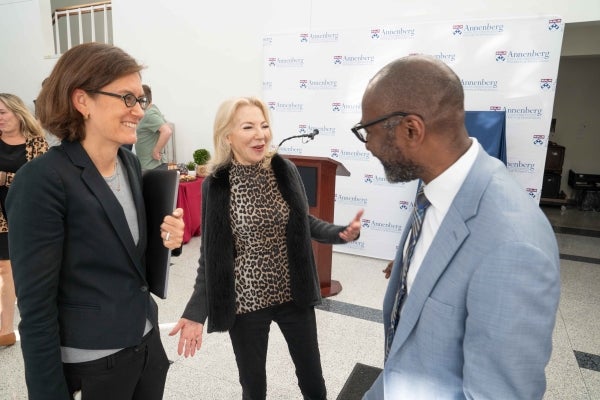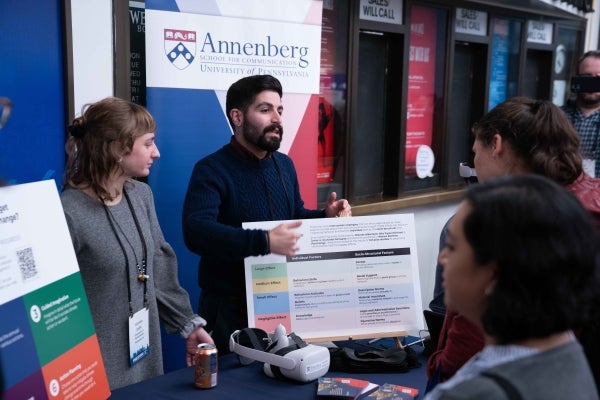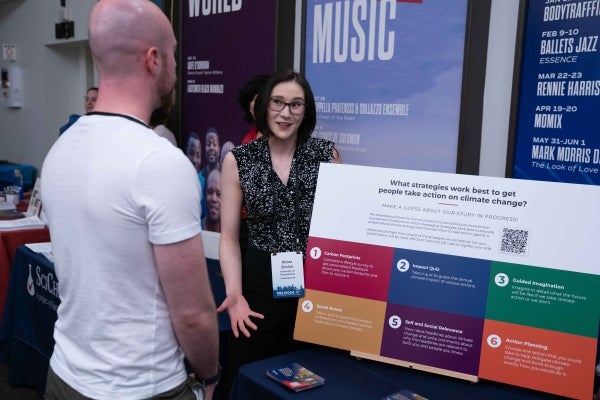
What Are the Most Effective Strategies To Inspire Action on Climate Change?
The Communication Neuroscience Lab conducted an intervention tournament, testing six strategies to change beliefs and intentions regarding climate change.
It’s often challenging for individuals to feel like they can make an impact in the global climate debate — if they even know how. Contacting your representatives to tell them you care about climate issues? Swapping out beef for chicken or vegetables? Even when people understand what they should be doing, they often default to inaction because the crisis can seem so distant from everyday life or scary to think about.

To figure out how to effectively motivate people toward climate change action, researchers in the Communication Neuroscience Lab at the Annenberg School, the Climate Communication Division of the Annenberg Public Policy Center (APPC), and the Penn Center for Science, Sustainability and the Media (PCSSM) tested numerous methods to educate people about climate change and spur them to take action. Ranging from quizzes to imagination exercises, the researchers hoped to determine which strategies are most effective and for whom.
“Climate change is primarily a problem of human behavior. As psychologists and communication scientists, we have the tools to discover how we can motivate people to feel like they can and should take action,’” said Allie Sinclair, study leader and the Joan Bossert Postdoctoral Research Fellow in the Communication Neuroscience Lab and PCSSM.

The interdisciplinary team ran experiments with more than 7,500 people to test various strategies informed by how the brain works. After every intervention, participants were asked to rate their intentions to do things like engage in individual and community-focused climate mitigating actions, share articles about the climate crisis, or sign petitions about climate policy, as well as emotional aspects, such as how distant the climate crisis feels to them — in terms of time, geographic space, and personal impact.
“By using the tournament format, we could test many different behavioral interventions at the same time and see which intervention worked best for each goal, and for which demographic groups,” Sinclair said.
The team used strategies that tap into several well-defined psychological processes.
For example, several interventions tap into people's sense of what is relevant to them or people they care about. In some interventions, participants reflected on why climate-related news matters to themselves or to people they know; these interventions were the best for motivating people to share climate news and petitions.
The strategies focused on imagining the future were based on previous research led by Sinclair showing that when people fire up their imaginations to picture a COVID-19-related scenario — like a person contracting the virus at a party — it can change beliefs about the risk of catching COVID-19, and willingness to take risks in daily life. A similar intervention in the tournament effectively motivated people to take action to address climate change.

Finally, the strategies focused on impact included providing information about which actions are most beneficial for the environment or guiding people to brainstorm personal benefits of actions that are good for both you and the planet.
"In ongoing work, we’re testing interventions that combine multiple strategies and exploring how we can bridge the partisan divide on climate change," Sinclair said. "We hope to translate our winning interventions into interactive online tools that anyone can use."
Members of the lab involved in the tournament included Annenberg Vice Dean Emily Falk, Post- Doctoral Fellow Allie Sinclair, Research Director Dani Cosme, Senior Research Coordinator José Carreras-Tartak, Annenberg doctoral student Kirsten Lydic, as well as Penn Psychology doctoral students Taurean Butler and Christian Benitez. The team also collaborated with Presidential Distinguished Professor Michael Mann and Administrative Coordinator Heather Kostick at PCSSM.
